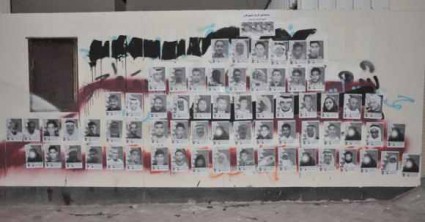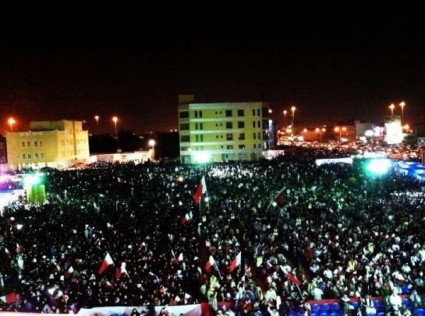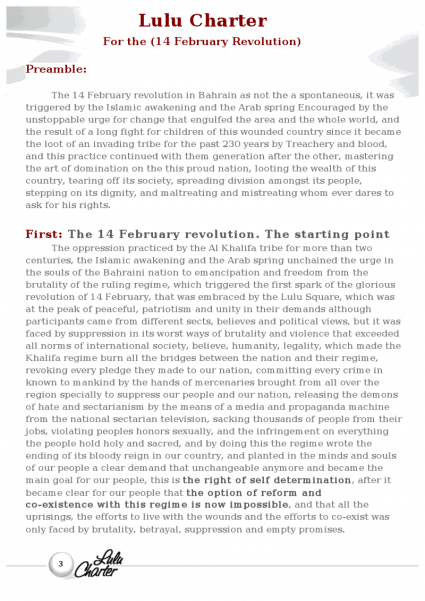Two Seas Revolt
February 7, 2012 No Comments
Even the walls call for your fall Hamad!
…more at rebellious walls
February 7, 2012 No Comments
The revolutions getting louder than Hamad’s heart beating in fear!
February 7, 2012 No Comments
The Volume only gets louder from here King Hamad!
February 7, 2012 No Comments
The Systematic Use of Terror – We know who the terrorist is…
February 7, 2012 No Comments
Revolution resonates for all who seek freedom from tyranny
February 7, 2012 No Comments
You can’t take My Soul
February 7, 2012 No Comments
Crank it up Fadheela
February 7, 2012 No Comments
Bahraini mother freed after months in jail for revolutionary music
Bahraini mother freed after months in jail for revolutionary music
6 February, 2012 – alakhbar
Prominent Bahraini activist Fadheela Al-Mubarak was freed on Monday, nearly a year after being arrested for listening to revolutionary music, as pro-democracy protests continue.
Mubarak was among the first female activists to have been arrested in Bahrain when she was taken into custody at a checkpoint in March.
She was sentenced to 18 months in jail by Bahraini authorities for listening to music that is common among many of the protesters, but is deemed revolutionary by the authorities.
Mubarak was the first female to be tried in a military court in Bahrain.
Her plight became a key talking point on social networking sites after her nine-year-old son Mahdi and her brother Ali posted an emotional video appeal for her release online.
In the video, Mahdi appealed for the authorities to release her, saying “I don’t like to live without my mother.”
On Monday, activist Ahlam Alkuzaie tweeted a picture showing Mubarak free and smiling.
Also released on Monday was Naser Al-Raas, a Canadian citizen who had been jailed last Wednesday for breaking the country’s illegal-assembly laws during pro-democracy protests.
Elsewhere in the state activists continued their week of protests against the government.
On Sunday, thousands of people took to the streets in Manama, including families of the women detained calling for their release outside the central police station. …more
February 7, 2012 No Comments
Stopping Spy Tech Transfer that enables Brutal Regimes
Time to Act on Companies Selling Mass Spy Gear to Authoritarian Regimes
February 7, 2012 – By Trevor Timm – EFF
On Wednesday, EFF will give recommendations to the European Parliament for how to combat one of the most troubling problems facing democracy activists around the world: the fact that European and American companies are providing key surveillance technology to authoritarian governments that is then being used to aid repression.
Recent reports by the Wall Street Journal and Bloomberg News have exposed the shadowy but growing industry that sells electronic spy gear to governments known for violating human rights. The technology’s reach is very broad: governments can listen in on cell phone calls, use voice recognition to scan mobile networks, read emails and text messages, censor web pages, track one’s every movement using GPS, and can even change email contents while en route to a recipient. Some tools are installed using the same type of malicious malware and spyware used by online criminals to steal credit card and banking information. They can secretly turn on webcams built into personal laptops and microphones in unused cell phones. And all of this information is filtered and organized on such a massive scale that it can be used to spy on every person in an entire country.
Ordinary citizens, journalists, human rights campaigners and democracy advocates have all been targeted, eviscerating privacy rights and chilling free speech. Ample evidence suggests information acquired through this spy gear appears has played a role in the harassment, threats, and even torture of journalists, human rights campaigners, and democracy activists. Yet dozens of companies from the U.S. and E.U continue to sell this technology, including to authoritarian regimes. The market for surveillance equipment has grown to a staggering $5 billion a year.
Dutch member of the EU Parliament Marietje Schaake has been trying to spearhead an effort to curb sales of this type of technology to repressive regimes. In September, the EU parliament passed a resolution proposed by Ms. Schaake which called on European countries to regulate sales of this dangerous surveillance tools if they can be used in human rights violations. She has also asked the European Commission to investigate sales by these companies to the governments of Bahrain, Yemen, Syria, Tunisia and Egypt. On Wednesday, EFF will be testifying at a workshop for Committee of International Trade and Committee on Foreign Affairs, co-chaired by Ms. Schaake. Here is part of what we will say:
Transparency
First, transparency is key. The mass surveillance industry as a whole has been notoriously secretive and that has, in turn, allowed it to proliferate without meaningful safeguards. But we know that just having this information in the public eye can, by itself, force change. Companies have pulled out of countries and created official human rights policies thanks to news reports. The world program director of I.S.S. Tatiana Lucas even complained that shining a spotlight on these practices “makes U.S. manufacturers gun shy about developing, and eventually exporting, anything that can remotely be used to support government surveillance.” We want to turn up the heat on these companies even more to be accountable for selling to authoritarian regimes. …more
February 7, 2012 No Comments
The GCC and NATO lose their leadership
The GCC and NATO lose their leadership
by Thierry Meyssan -Voltaire Network – 5 February, 2012
Contrary to her position at the time of the attack on Iraq, in the case of Syria France failed to defend the principles of international law, rallying instead the imperial camp and its lies. Together with the United Kingdom and the United States, she has suffered a diplomatic defeat of historic proportions, while Russia and China have become the champions of the sovereignty of peoples and peace. The new international balance of power is not only a consequence of the United States’ military decline, it is also a penalty for their falling prestige. Ultimately, Western powers have lost the leadership they enjoyed throughout the twentieth century, having forsaken all legitimacy by betraying their own values.
On two occasions, 4 October 2011 and 4 February 2012, permanent members of the UN Security rebuffed draft resolutions on the situation in Syria. This showdown has pitted members of the Gulf Cooperation Council (GCC) and the North Atlantic Treaty Organization (NATO) against those of the Shanghai Cooperation Organization (SCO).
The end of the unipolar world
This quadruple veto seals the end of a period of international relations that began with the collapse of the Soviet Union and witnessed the undivided domination of the United States over the rest of the world. It does not signify a return to the previous bipolar system, but the emergence of a new model whose contours are yet to be defined. None of the New World Order projects have been achieved. Washington and Tel Aviv have failed to institutionalize the unipolar governance they intended to impose as an inviolable paradigm, while the BRICS fell short of creating a multipolar system that would have enabled its members to rise to the highest level.
As Syrian strategist Imad Fawzi Shueibi had rightly anticipated, the Syrian crisis has crystallized a new balance of power, and from there a redistribution of power that no one had foreseen or wanted, but which must be accepted as an inescapable reality. [1]
In retrospect, Hillary Clinton’s “leadership from behind” doctrine appears as an attempt by the United States to test their limits, while shifting the responsibility on their British and, especially, French allies. Yet, it was they who burst on the scene imposing themselves as political and military leaders during the overthrow of the Libyan Arab Jamahiriya, something they hoped to live through again by toppling the Syrian Arab Republic, even if they did so as vassals and sub-contractors of the U.S. empire. So it is London and Paris, even more than Washington, that suffered a diplomatic defeat and bear the consequences in terms of loss of influence. …more
February 7, 2012 No Comments
ALBA countries join chorus condemning “Contras” interference in Syria
ALBA countries join chorus condemning “Contras” interference in Syria
Voltaire Network – 7 February 2012
In a statement issued during the eleventh summit of the organization, the nine members of the ALBA bloc (Bolivarian Alliance for the Peoples of Our America) rejected on Sunday the “systematic policy of interference and destabilization” that seeks to “impose by force on the Syrian people a regime change.”
The ALBA resolution condemns the “acts of armed violence that paramilitary groups supported by foreign powers have unleashed against the Syrian people.”
The heads of States members of the organization for Latin American integration have further lent support to the “national reform process initiated by the government of President Bashar al-Assad,” who seeks a “political solution to the current crisis respectful of the Syrian people’s sovereignty and the territorial integrity of that Arab country.”
The Atlanticist and Gulf States, and their communication relays, accuse the Syrian government of brutally quelling peaceful protests. On the other hand, the Syrian government maintains that these same countries have been sponsoring the armed groups responsible for the sabotage operations occurring in the country, which have killed several thousand citizens, both civilian and military. The Arab League monitors have disqualified their own governments’s accusations and to a large extent validated the Syrian’s Governments version of events.
While the cynicism underpinning the destabilization strategy underway may leave many Europeans incredulous, the same does not apply in the case of Latin America. There, the role of the “Contras” is still fresh people’s minds, and the parallel with the Syrian situation is made immediately.
These armed groups (in Spanish: “Counter-Revolutionary”) were sponsored and trained first by the Argentinian dictatorship, acting as a sub-contractor, then directly by the Carter and Reagan administrations to overthrow the socialist government of Nicaragua during the 1980’s. They launched raids targeting the economy and the population of Nicaragua from rear bases located in Honduras.
This phony civil war, orchestrated by the United States against a sovereign state and a people, is estimated to have caused 57 000 casualties, including 29,000 dead. …more
February 7, 2012 No Comments
Return to Lulu – A New Season of Dissent
February 7, 2012 No Comments
Ali Abdullah dead from tear gas asphyxiation following more illegal use of Less-than-lethal munitions
Another Bahraini killed by toxic tear gas
6 February, 2012 – By shiapost
Another Bahraini civilian has died of asphyxia after Saudi-backed regime forces fired toxic tear gas into a house, activist reported.
Ali Abdullah died on Monday several days after regime forces attacked his house using tear gas.
Bahraini troops heavily rely on tear gas and stun grenades in dispersing peaceful anti-government protesters. Several Bahraini civilians, mostly senior citizens and kids, who had not participated in protest rallies have also died from asphyxia after regime troops fired tear gas in residential areas and into homes in violation of international standards that Bahrain is a signatory to.
Amnesty International has warned about the Bahraini government’s misuse of tear gas against anti-regime protesters and has called for an investigation into the tear gas-related deaths.
Meanwhile, thousands of anti-government protesters have started a week-long rally in the northern village of Muqsha, west of the capital, Manama, pressing for their demands and condemning the suppression of protests.
They also called for the immediate release of political prisoners.
Bahraini opposition groups, which organized the demonstrations, said the protest would continue until February 14, the first anniversary of the popular uprising in Bahrain.
Anti-government protesters have also vowed to march toward the site of Pearl Square, the epicenter of the country’s uprising which was razed down last year as part of Manama’s crackdown on protests. It is now called Martyr’s Square.
“This is a dress rehearsal for the return. We will return! We will return! Soon our sit-in will not be here but at the Pearl Square,” said poetess Ayat al-Qormozi, who was jailed for reading out a poem criticizing the king at Pearl Square. …source
February 7, 2012 No Comments
Crackdown on Demonstrators intensifies in Bahrain on the First Anniversary of the February 14, Protests
Bahrain: a Crackdown on Demonstrators in the First Anniversary of the Feb. 14 Protests
30 January, 2012 – Bahrain Youth Society for Human Rights
Bahraini authorities have launched a security crackdown in the first anniversary of the protests on February 14, Security forces and the forces in civilian clothes raided the houses and arrested demonstrators brutally.
Witnesses told Bahrain Youth Society for Human Rights (BYSHR) that Security forces raided the houses in Bani Jamra, Sanabis, Daih, Nuwaidrat and other areas in recent days.
The BYSHR believes that the arrests are proactive security crackdown before 14 February, after called for opposition groups to return to the Pearl roundabout (the location of the protests, which was demolished by authorities).
According to the information, the authorities arrested in recent weeks, more than 70 demonstrators during the protests.
The Bahrain Youth Society for Human Rights (BYSHR) expresses its deep concern regarding the arrests and demanded the authorities to protect freedom of assembly and opinion.
…more
February 7, 2012 No Comments
Riot Control or Attempted Murder? “The policeman put the shotgun on his left thigh, his veins had burst…”
February 7, 2012 No Comments
Why Civil Resistance Works – The Strategic Logic of Nonviolent Confict
Our findings show that major nonviolent campaigns have achieved success 53 percent of the time, compared with 26 percent for violent resistance campaigns. There are two reasons for this success. First, a campaign’s commitment to nonviolent methods enhances its domestic and international legitimacy and encourages more broad-based participation in the resistance, which translates into increased pressure being brought to bear on the target. Recognition of the challenge group’s grievances can translate into greater internal and external support for that group and alienation of the target regime, undermining the regime’s main sources of political, economic, and even military power.
Why Civil Resistance Works
by Maria J. Stephan and Erica Chenoweth
The Strategic Logic of Nonviolent Confict
Implicit in recent scholarly debates about the efficacy of methods of warfare is the assumption that the most effective means of waging political struggle entails violence. Among political scientists, the prevailing view is that opposition movements select violent methods because such means are more effective than nonviolent strategies at achieving policy goals.2 Despite these assumptions, from 2000 to 2006 organized civilian populations successfully employed nonviolent methods including boycotts, strikes, protests, and organized noncooperation to challenge entrenched power and exact political concessions in Serbia (2000), Madagascar (2002), Georgia (2003) and Ukraine (2004–05), Lebanon (2005), and Nepal (2006). The success of these nonviolent campaigns—especially in light of the enduring violent insurgencies occurring in some of the same countries—begs systematic investigation.
Extant literature provides explanations as to why nonviolent campaigns are effective means of resistance. Little of the literature, however, comprehensively analyzes all known observations of nonviolent and violent insurgencies as analogous resistance types.5 This study aims to all this gap by systematically exploring the strategic effectiveness of violent and nonviolent campaigns in conflicts between non-state and state actors using aggregate data on major nonviolent and violent resistance campaigns from 1900 to 2006. To better understand the causal mechanisms driving these outcomes, we also compare our statistical findings with historical cases that have featured periods of both violent
and nonviolent resistance.
Our findings show that major nonviolent campaigns have achieved success 53 percent of the time, compared with 26 percent for violent resistance campaigns. There are two reasons for this success. First, a campaign’s commitment to nonviolent methods enhances its domestic and international legitimacy and encourages more broad-based participation in the resistance, which translates into increased pressure being brought to bear on the target. Recognition of the challenge group’s grievances can translate into greater internal and
external support for that group and alienation of the target regime, undermining the regime’s main sources of political, economic, and even military power.
Second, whereas governments easily justify violent counterattacks against armed insurgents, regime violence against nonviolent movements is more likely to backfire against the regime. Potentially sympathetic public’s perceive violent militants as having maximalist or extremist goals beyond accommodation, but they perceive nonviolent resistance groups as less extreme, thereby enhancing their appeal and facilitating the extraction of concessions through bargaining. Our findings challenge the conventional wisdom that violent resistance against conventionally superior adversaries is the most effective way for resistance groups to achieve policy goals. Instead, we assert that nonviolent resistance is a forceful alternative to political violence that can pose effective challenges to democratic and nondemocratic opponents, and at times can do so more effectively than violent resistance.
The article proceeds as follows. The first section presents our main argument. The second section introduces the data set and reports our preliminary empirical findings. In the third section, we evaluate three case studies of nonviolent and violent campaigns in Southeast Asia.We conclude with some theoretical and policy recommendations derived from these findings.
…full report PDF HERE …slides HERE
February 7, 2012 No Comments
The Declaration of Independence belongs to all People Everywhere – even when those who claim foundation by it, fail to respect it
Declaration of Independence
When in the Course of human events, it becomes necessary for one people to dissolve the political bands which have connected them with another, and to assume among the powers of the earth, the separate and equal station to which the Laws of Nature and of Nature’s God entitle them, a decent respect to the opinions of mankind requires that they should declare the causes which impel them to the separation.
The next section, the famous preamble, includes the ideas and ideals that were principles of the Declaration. It is also an assertion of what is known as the “right of revolution”: that is, people have certain rights, and when a government violates these rights, the people have the right to “alter or abolish” that government.
We hold these truths to be self-evident, that all men are created equal, that they are endowed by their Creator with certain unalienable Rights, that among these are Life, Liberty and the pursuit of Happiness. — That to secure these rights, Governments are instituted among Men, deriving their just powers from the consent of the governed, — That whenever any Form of Government becomes destructive of these ends, it is the Right of the People to alter or to abolish it, and to institute new Government, laying its foundation on such principles and organizing its powers in such form, as to them shall seem most likely to effect their Safety and Happiness. Prudence, indeed, will dictate that Governments long established should not be changed for light and transient causes; and accordingly all experience hath shewn, that mankind are more disposed to suffer, while evils are sufferable, than to right themselves by abolishing the forms to which they are accustomed. But when a long train of abuses and usurpations, pursuing invariably the same Object evinces a design to reduce them under absolute Despotism, it is their right, it is their duty, to throw off such Government, and to provide new Guards for their future security.
February 7, 2012 No Comments
Echos of Post Colonial Dissent
February 7, 2012 No Comments
Lulu Charter
…full document PDF HERE
February 7, 2012 No Comments
And what if the thugs were the local police – would you resist by any means necessary?
February 7, 2012 No Comments
Would You Resist the thugs entering your Village or Neighborhood?
February 7, 2012 No Comments
What if this were your Village or Neighborhood?
February 7, 2012 No Comments
Washington ignores its own civilian body counts in the region, spins Syria’s ‘Benghazi moment’
From Washington this looks like Syria’s ‘Benghazi moment’. But not from here
Robert Fisk – 07 February 2012 – The Independent
President Bashar al-Assad is not about to go. Not yet. Not, maybe, for quite a long time. Newspapers in the Middle East are filled with stories about whether or not this is Assad’s “Benghazi moment” – these reports are almost invariably written from Washington or London or Paris – but few in the region understand how we Westerners can get it so wrong. The old saw has to be repeated and repeated: Egypt was not Tunisia; Bahrain was not Egypt; Yemen was not Bahrain; Libya was not Yemen. And Syria is very definitely not Libya.
It’s not difficult to see how the opposite plays in the West. The barrage of horrifying Facebook images from Homs, and statements from the “Free Syrian Army”, and the huffing of La Clinton and the amazement that Russia can be so blind to the suffering of Syrians – as if America was anything but blind to the suffering of Palestinians when, say, more than 1,300 were killed in Israel’s onslaught on Gaza – doesn’t gel with reality on the ground. Why should the Russians care about Homs? Did they care about the dead of Chechnya?
Look at it the other way round. Yes, we all know that Syria’s intelligence service has committed human rights abuses. They did that in Lebanon. Yes, we all know this is a regime in Damascus, not an elected government. Yes, we all know about corruption. Yes, we watched the UN’s humiliation at the weekend – although why La Clinton should expect the Russians to click their heels after the “no-fly zone” in Libya turned into “regime change” is a bit of a mystery.
The destruction of the Alawite-led government in Syria – which means in effect, a Shia regime – will be a sword in the soul of Shia Iran. And look at the Middle East now from the windows of the massive presidential palace that overlooks the old city of Damascus. True, the Gulf has turned against Syria. True, Turkey has turned against Syria (while generously offering Bashar exile in the old Ottoman empire).
But look east, and what does Bashar see? Loyal Iran standing with him. Loyal Iraq – Iran’s new best friend in the Arab world – refusing to impose sanctions. And to the west, loyal little Lebanon refusing to impose sanctions. Thus from the border of Afghanistan to the Mediterranean, Assad has a straight line of alliances which should prevent, at least, his economic collapse. …more
February 7, 2012 No Comments
US Media Sounds Alarm, Outrage over Syria Civilian Body Count – Where was outrage over body counts when they were “in bed” with US troops?
Civilian Body Counts During Recent Conflicts
Afghanistan 9,415 – 29,007
Iraq no less than 864,531
Pakistan (Drone Attacks Only) 1,731 – 2,696
Libya 12,978 to 16,948
Syria 3,673 to 7,276
February 7, 2012 No Comments


































